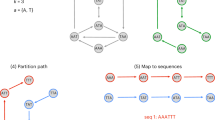Abstract
Whiplash PCR-based methods of biomolecular computation (BMC), while highly-versatile in principle, are well-known to suffer from a simple but serious form of self-poisoning known as back-hybridization. In this work, an optimally re-engineered WPCR-based architecture, Displacement Whiplash PCR (DWPCR) is proposed and experimentally validated. DWPCR’s new rule protect biostep, which is based on the primer-targeted strand-displacement of back-hybridized hairpins, renders the most recently implemented rule-block of each strand unavailable, abolishing back-hybridization after each round of extension. In addition to attaining a near-ideal efficiency, DWPCR’s ability to support isothermal operation at physiological temperatures eliminates the need for thermal cycling, and opens the door for potential biological applications. DWPCR should also be capable of supporting programmable exon shuffling, allowing XWPCR, a proposed method for programmable protein evolution, to more closely imitate natural evolving systems. DWPCR is expected to realize a highly-efficient, versatile platform for routine and efficient massively parallel BMC.
Preview
Unable to display preview. Download preview PDF.
Similar content being viewed by others
References
Hagiya, M., Arita, M., Kiga, D., Sakamoto, K., Yokoyama, S.: Towards parallel evaluation and learning of boolean μ-formulas with molecules. In: Rubin, H., Wood, D. (eds.) DNA Based Computers III, pp. 57–72 (2000)
Sakamoto, K., Kiga, D., Komiya, K., Gouzu, H., Yokoyama, S., Ikeda, S., Sugiyama, H., Hagiya, M.: State transitions by molecules. Biosystems 52, 81–91 (1999)
Rose, J.A., Hagiya, M., Deaton, R.J., Suyama, A.: A DNA-based in vitro genetic program. J. Biol. Phys. 28, 493–498 (2002)
Wood, D., Bi, H., Kimbrough, S., Wu, D.J., Chen, J.: DNA starts to learn poker. In: DNA Computing. 7th Int’l Workshop on DNA-Based Computers, pp. 22–32 (2002)
Rose, J.A., Takano, M., Hagiya, M., Suyama, A.: A DNA computing-based genetic program for in vitro protein evolution via constrained pseudomodule shuffling. Journal of Genetic Programming and Evolvable Machines 4 (2003)
Komiya, K., Sakamoto, K., Gouzu, H., Yokohama, S., Arita, M., Nishikawa, A., Hagiya, M.: Successive State Transitions with I/O Interface by Molecules. In: Condon, A., Rozenberg, G. (eds.) DNA 2000. LNCS, vol. 2054, pp. 17–26. Springer, Heidelberg (2001)
Komiya, K., Sakamoto, K., Kameda, A., Yamamoto, M., Ohuchi, A., Kiga, D., Yokoyama, S., Hagiya, M.: DNA polymerase programmed with a hairpin DNA incorporates a multiple-instruction architecture into molecular computing. Biosystems 83, 18–25 (2006)
Rose, J.A., Deaton, R.J., Hagiya, M., Suyama, A.: Equilibrium analysis of the efficiency of an autonomous molecular computer. Phys. Rev. E 65, 1–13, Article 021910 (2002)
Komiya, K., Yaegashi, S., Suyama, A., Hagiya, M., Rose, J.A.: Experimental validation of the statistical thermodynamic model for prediction of the behavior of autonomous molecular computers based on DNA hairpin formation. In: DNA Computing. 12th Int’l Workshop on DNA-Based Computers (in press, 2006)
New England Biolabs: Klenow Fragment (3L→5L exo-) Technical Bulletin M0212 (2004)
Arita, M., Nishikawa, A., Hagiya, M., Komiya, K., Sakamoto, K., Gouzu, H., Yokoyama, S.: Improving sequence design for DNA computing. In: Proc. 5th Genetic and Evolutionary Computation Conference (GECCO 1999), Las Vegas, pp. 875–882 (2000)
Marras, S., Kramer, F., Tyagi, S.: Efficiencies of FRET and and contact-mediated quenching in oligonucleotide probes. Nucl. Acids. Res. 30, e122 (2002)
Rose, J.A., Deaton, R.J., Suyama, A.: Statistical thermodynamic analysis and design of oligonucleotide based computers. Natural Computing 3 (2004)
SantaLucia, J. J., Hicks, D.: The thermodynamics of DNA structural motifs. Annu. Rev. Biophy. Biomolec. Struct. 33, 415–440 (2004)
Kubota, M., Ohtake, K., Komiya, K., Sakamoto, K., Hagiya, M.: Branching DNA machines based on transitions of hairpin structures. In: Proc. Congr. Evol. Comp (CEC 2003), pp. 2542–2548 (2003)
Author information
Authors and Affiliations
Editor information
Editors and Affiliations
Rights and permissions
Copyright information
© 2006 Springer-Verlag Berlin Heidelberg
About this paper
Cite this paper
Rose, J.A., Komiya, K., Yaegashi, S., Hagiya, M. (2006). Displacement Whiplash PCR: Optimized Architecture and Experimental Validation. In: Mao, C., Yokomori, T. (eds) DNA Computing. DNA 2006. Lecture Notes in Computer Science, vol 4287. Springer, Berlin, Heidelberg. https://doi.org/10.1007/11925903_31
Download citation
DOI: https://doi.org/10.1007/11925903_31
Publisher Name: Springer, Berlin, Heidelberg
Print ISBN: 978-3-540-49024-1
Online ISBN: 978-3-540-68423-7
eBook Packages: Computer ScienceComputer Science (R0)




